Here are the tables showing how many UCI points are available in each road race. It’s not riveting but normally if you want to know how many points are on offer then you visit the UCI website, find the rules page, download the right PDF rulebook and scroll past 70 pages for the tables. Here they’re all on one page.
Last year saw big changes to the scales with the grand tours, monuments and world championships becoming even more lucrative. This year and in the coming seasons the difference is the participation rules, which Pro Team qualifies for what.
The table below is for the World Tour races, if it’s a stage race then it’s for the final overall classification. You can see the overall win in the Tour de France is the single biggest points haul in the sport, and among other things winning the Tour Down Under is more valuable that winning Itzulia Basque Country, according to the rankings:
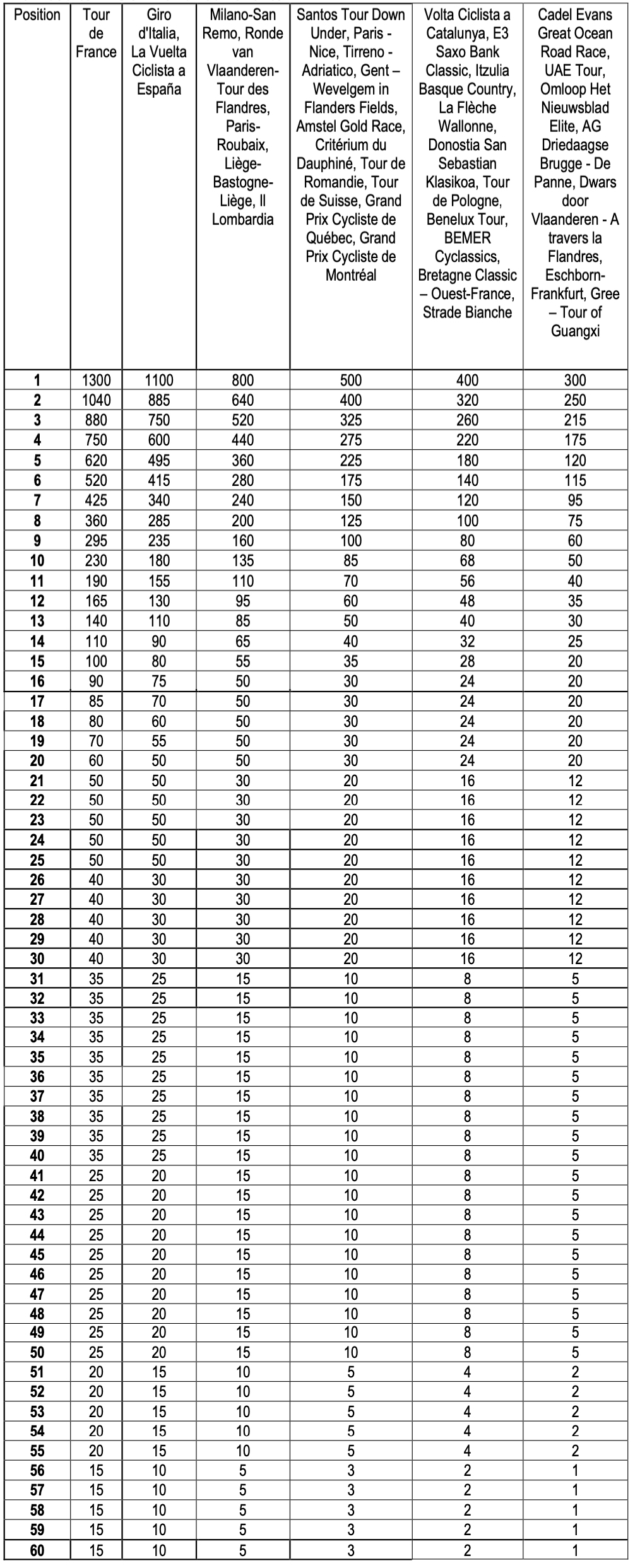
Next comes the points per stage in the World Tour stage races. In 2023 this was doubled for the grand tours, plus across all stage races points get awarded well beyond first five or top three as before, it’s down to 15th place or 10th respectively. Win a stage race and stage wins and placings happen along the way so it reinforces the value of grand tours:
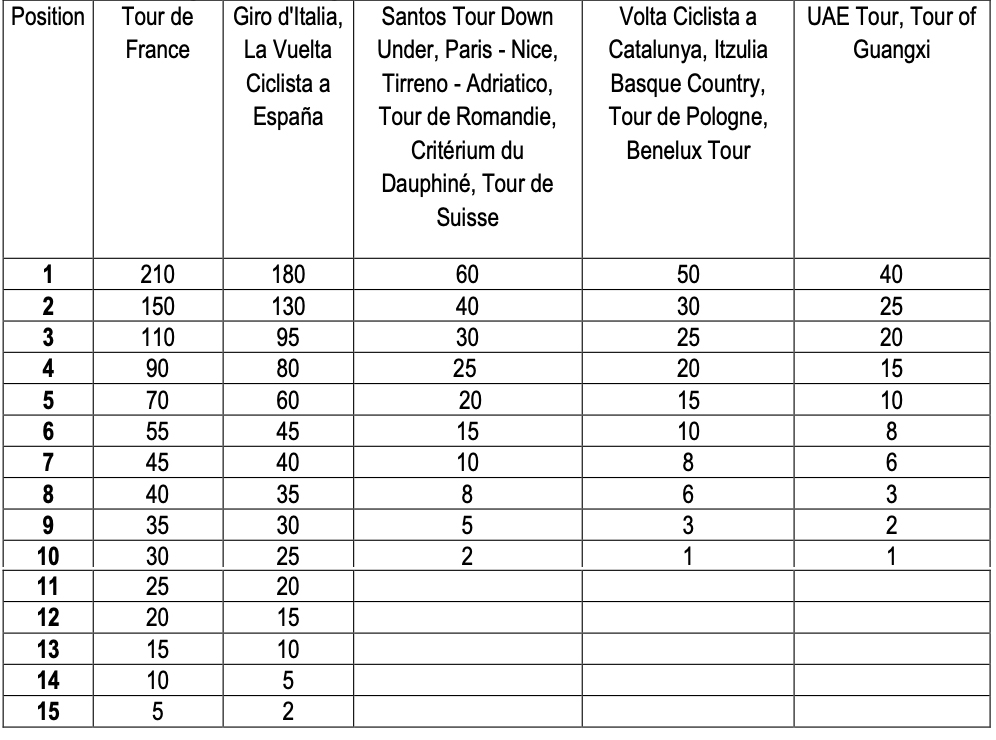
Next you can see points on offer for final place in the secondary competitions of a grand tour and other stage races, namely the mountains and points competition:

Next comes a daily award for leading a World Tour stage race, a nice bonus but one that’s surely worth more in publicity than points but again with the overall win and stage wins it helps compound things further, plus it just makes a day in the maillot jaune or maglia rosa more valuable points-wise:


Now comes arguably the most important table here because it’s for races outside the World Tour and this is where teams hunting points can find rewards thanks to the breadth of the calendar. We know the Tour de France has beaucoup points but the winner isn’t really targetting them, instead managers of teams trying stave off relegation or earn promotion will know the table below by heart. Here winning a stage race overall or winning a one day brings the same points haul, which makes one day races very important. The season-opening Challenge Majorca races are a good case study, they are each Class 1 races and so win one day’s racing and a rider banks 125 points, but if it was a stage race only the final overall would bring this many points:
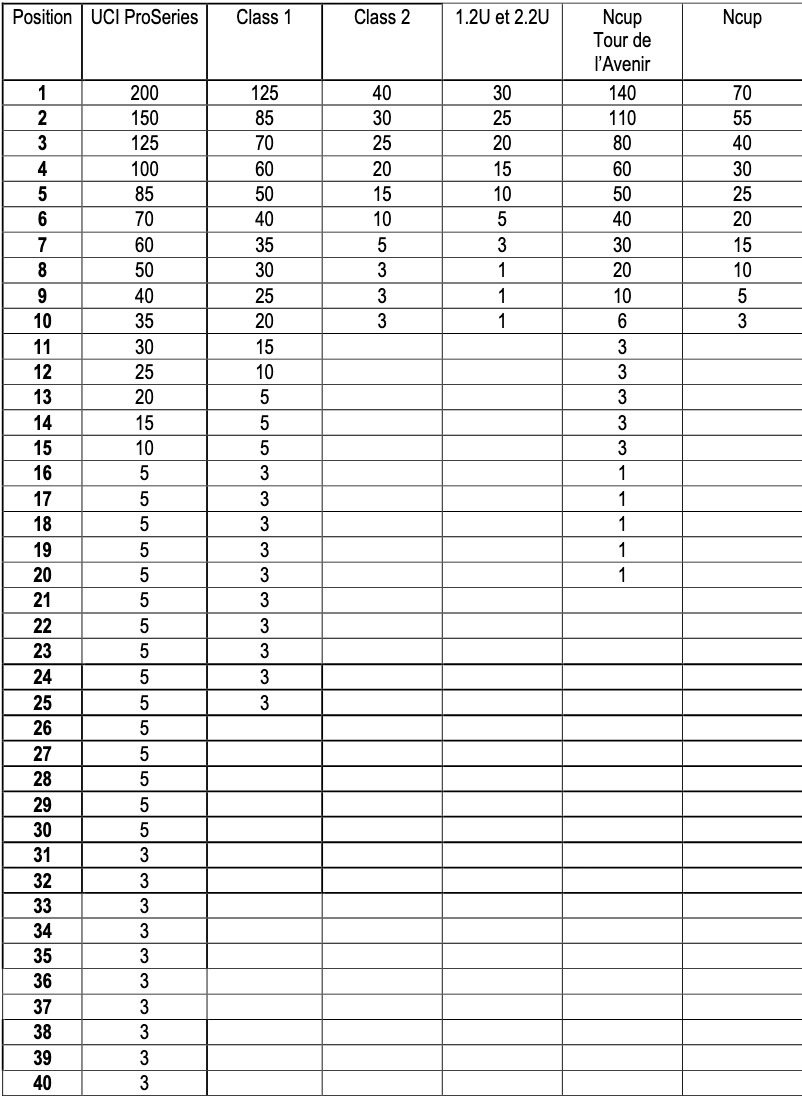
The next two tables below shows the points on offer for stages in non-World Tour races and the daily points for leading the race too:


Below are the national championships, split into A and B groups, where A is defined as a nation that started at least one rider in the previous Men’s Elite world championship road race. These points matter because often when we look at the teams with few wins and placings in the year, several of their best results can be from national championships in smaller nations, the kind with only a few pros. Sometimes we’ve seen big name riders skip their national championships but smaller teams hunting points ought be paying business class returns for their riders to go and grab the jersey and points:
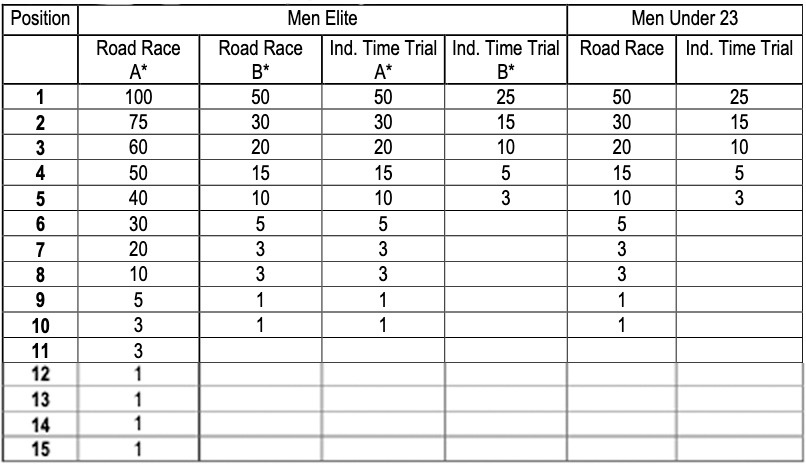
Now comes the Continental Championships, think the European championships for the best example. If these championships have a team time trial and/or a mixed relay time trial event, the small table further below also applies:
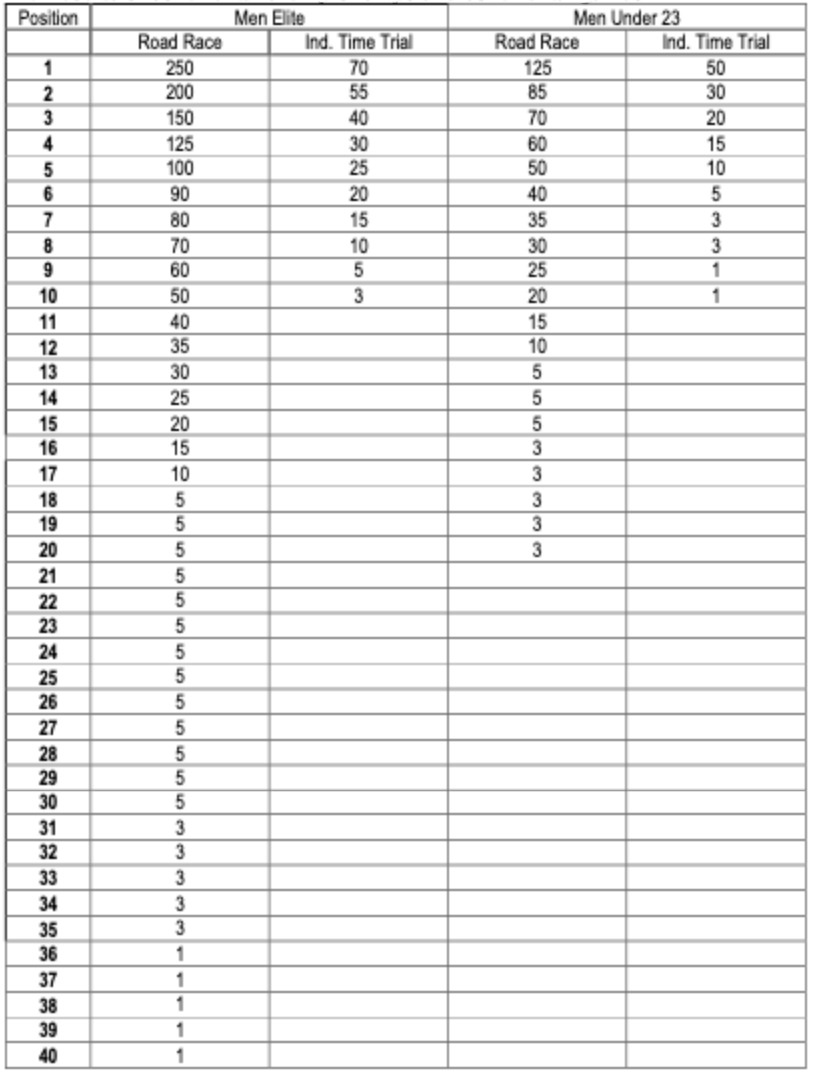
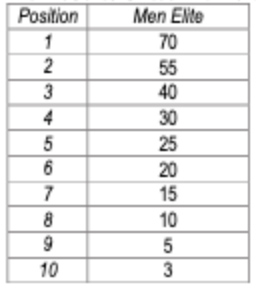
Now for the Worlds and Olympics, big events but the UCI is keen to big them up even more and they are the most lucrative one day races on the calendar in terms of points, 100 more than a Monument classic:
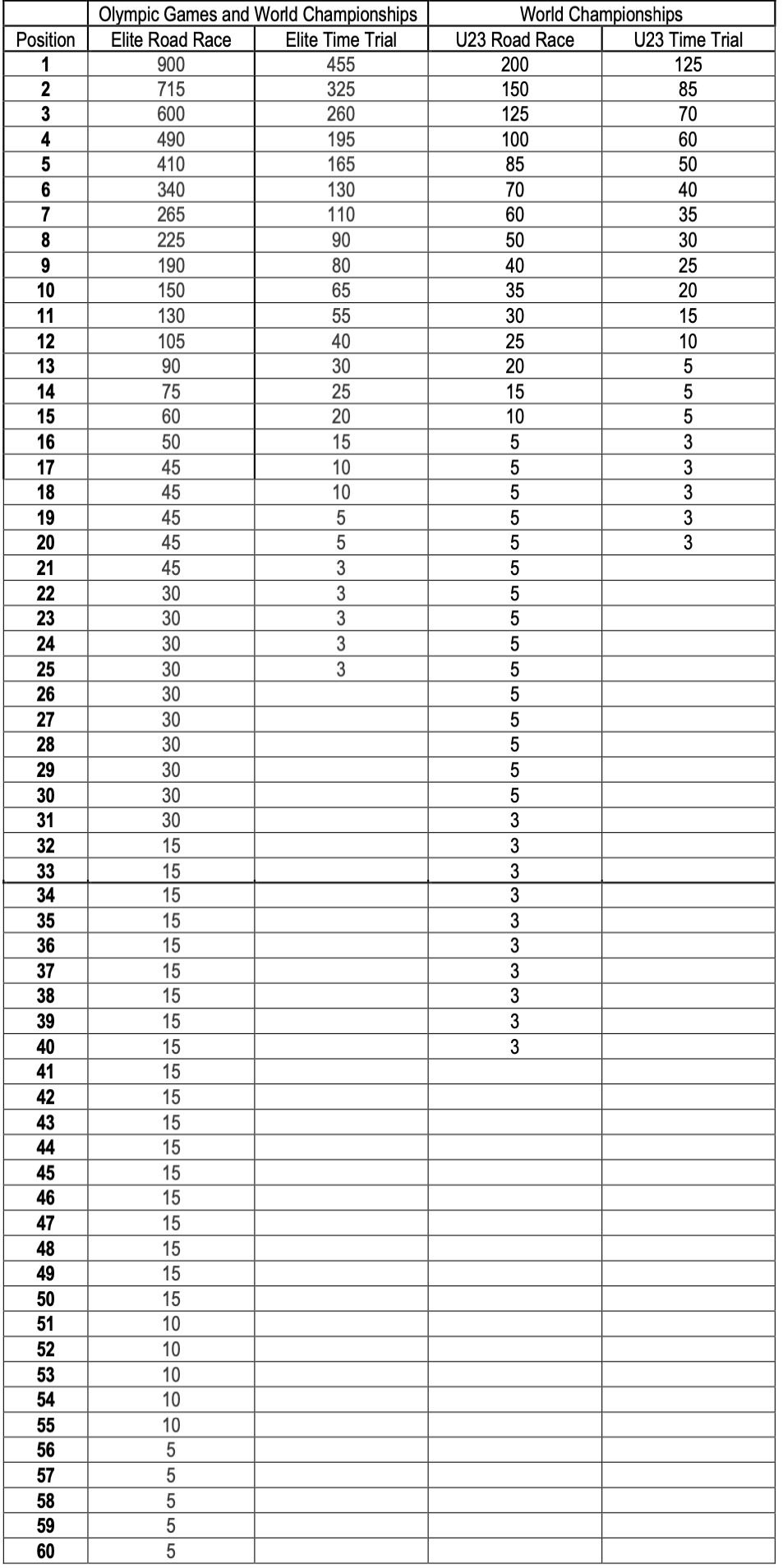
For the last of the tables, here’s the mixed relay time trial at the worlds which the UCI is keen on promoting, it’s 300 points but this is divided by the three men, so 100 points each (of course the women get 100 each too):
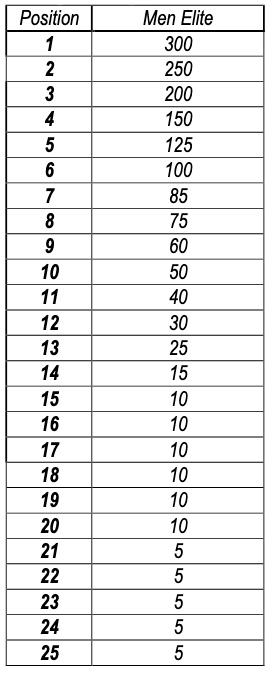
How to forfeit points
Riders can lose points too. The UCI rules include penalties for bad behaviour and some come with points deductions. They concern cheating like taking short-cut, to using sidewalks, ignoring level-crossing red lights, littering and other misdemeanours, right down to failing to sign on for the day’s racing or show up for the post-race press conference if invited. Any team manager worried about scoring points should remind riders of all of these.

Rankings and points don’t matter…
…if they did then they’d be readily available, easily understood and we’d talk about them more often. Still, promotion and relegation from the World Tour is a big deal as an “inside” topic. The one change for 2024 is that while invitations for the grand tours go to the two top-ranked Pro Teams of the previous season (Lotto-Dstny and IPT) and two discretionary “wildcards”, these two wildcards can only go to a team in the top-50 the previous season, in 2024 it’ll be top 40 and crucially in 2026 the top-30 which implies a stretch goal for the likes of current teams like Euskaltel-Euskadi or Corratec. In the coming days we’ll look at how these points are used to make individual and team rankings and the stakes in 2024 and beyond…


The spanish one-week races seem to be the real victims of this system, I don’t know why. Happily per them, their history and position in the calendar allows them to keep some good startlists.
Yeah, as it’s long been talked here it makes no sense. I suppose it’s precisely to confuse things, like, making less apparent the chasm between the true 7 week-long stage races and the modest stuff. If you want to have political leverage, you’ve got to twist reality first. For now, as you say, the damage is modest and both Pologne and Benelux Tour are enjoying a gradual and meaningful growth which is good for everyone, so the operation is more or less working. Presently, I’m more worried about the potential dismantling of the Italian Autumn which had recently been brought to a very fine level of quality and efficiency (in this case it’s also about RCS, not the UCI only). However, not long ago the Volta started to struggle after a lower-quality decade (2003-2013 aprox.) and in 2017 it was ‘forced’ to accept an agreement with ASO. At the beginning of the 10s, some 10 years ago, not centuries, Itzulia came close to being shut (the UCI was helpful in that case, well done) before a last-minute save by local banks. I wouldn’t play with fire – but I guess that Dauphiné or Romandie, the obvious candidates, *can’t* be used to mix them up with the lower category, and so… (I must admit that Romandie would equally be at risk, and a greater one, so it sort of makes sense to protect it).
Indeed, I had no idea the Volta and Itzulia were second-class World Tour stage races. Guess just a product of historical perceived status?
One question – does the young rider’s jersey get the same points as the mountains and points jersey?
Lots in here that was surprisingly interesting, thanks @inrng
Not for the youth prize, only “points and mountains”, presumably because youth is restrictive.
I wonder why these two Canadian races get so many points as both of them are in the middle of table? Does anybody really care what happens in Montreal or Quebec? I mean, no hard feelings, but many more renowed and probably more demanding races get less points for win…
Presumably to make the journey worthwhile, which is why they have two one day races when the peloton is there for a long weekend and could in theory have some kind of stage race. They’re maybe not the greatest races but they’re often hard fought and form part of the pre-Worlds approach for those riders not doing the Vuelta, typically one day specialists but not exclusively.
Calendar design is a whole other topic but the World Tour could do with at least a weekend in North America, it’s the minimum without the Tour of California, and here we have two well organised events, those riders who take part tend to like the experience.
I’d be happy if Maryland Classic could also have a sister 1.Pro race, to bolster pro cycling in the US.
Agreed. I they’re gonna call the thing WORLD Tour they should at least have races in more places than just Europe. Whether there should BE a World Tour is another question, best left for another time 🙂
The US TV sports setup is semi broken. All the money is going to streaming shows or a few select sports. They absolutely destroyed some of the college football leagues (Pac-12) with some mean spirted actions by Fox Sports and ESPN to keep Apple TV from becoming a player in sports. It is unfortunate as Apple might have made a play for olympic sports ounce they got got a base, now we will have to wait and see. Perhaps the more even-kneeled thinkers support cycling going forward.
By and large many olympic sports are hurting in the US with lower TV time and having to constantly chase dollars.
If you change your perspective to see points as a way of making some of the races outside of Europe more important, it makes some sense. The points will attract teams and riders, and they will create a history for the race, increasing it’s importance.
The points can be seen as reward for winning a prestigious race, and/or as a way of increasing a race’s importance and prestige. The UCI is international, and has a responsibility to grow cycling outside of Europe. This is one of the levers they have control over, so they’ll use it.
I see from the Olympics & Worlds table that Tarling’s decision to ride the Elite rather than the U23 TT at the Worlds last season paid off in terms of points as well as prestige.
All the better for him. Impressive to do this straight out of the junior ranks. It used to be that time trialling was a skill that took riders a while to master and if today there can be a lot of shortcuts to finding the right position and pacing which didn’t exist before (trial and error, even for the best; now there’s more experience and ways of measurement) it’s still impressive. Keen to see what he can do this year, especially in a race that has a long but not too steep climb.
The purists will be rolling in their graves to see the Tour Down Under in that list of week long races!
I know what you mean but might purists also be rolling at the thought of points having much meaning? Yes this blog will do a post to have the data all in one place for reference and to share the tables but it’s very rare during the season for points and rankings to be an issue, there more off-season things such as analysing things (ok, the season has started) or teams boasting about winning because if they do win then why not?
The short version is purists rate the races and results in themselves, rather than the rankings, no?
That’s exactly right from a fan point of view. If I was a race organizer I might feel insulted if *my* race was not given the same point status of some other race.
“The purists will be rolling in their graves” Not all of us are dead…yet! But at least winning TdU no longer (as far as I could see) offers the same points for winning as one of the 5 monuments. Putting it in with T-A, P-N, etc. seems fair IMHO.
It’s long long been there, and as everybody can see, it makes very little harm. It’s what Chris explains above, and, barring perhaps some serious confusion for new fans to the sport, all other impacts are positive, so why not?
The Pro series and Class 1 races are the bread-and-butter races of pro-cycling and always a joy to watch as the likes of Visma and UAE are not always there in full force.
The french calendar is a massive points grap for the french teams. You can sum up the points available and the propensity for french teams to score well in thoseb(while others don’t always recieve invites).
The French calendar works that way because the French federation has chosen to register domestic races on the UCI calendar and told domestic teams they must register as UCI Continental Teams in order to get on the start line.
Every federation can do what the French do if they choose to do so. Teams in other countries which are facing risk of relegation from the WorldTour should be putting pressure on their federations to give them better support.
Of course… how strictly you will really be asked to comply with some requisites is a different question, though. Then, the calendar. Asking for a given date and being awarded it is also where interesting margins for institutional decision do actually lie.
(That said, to make things clear, current Italian’s cycling woes depend little on present-state UCI and much more on local actors, starting with the national federation)
And a couple of further doubts… should really a national federation act strategically managing its local scene in order to boost trade teams which are corporate-sponsored? (Not sure about the answer, maybe “yes” as it’s a “win-win” for locals).
And do we *really* feel that national feds are in such comparable conditions between them that Khazakhstan, Israel, Switzerland or Norway can (or even “should”, don’t give the Khazakh ideas, they were already at it!) “simply” build up a whole race calendar as swollen as the French just to rack up points for WT or wannabe WT teams? *Or* for all which points also imply…
> (Not sure about the answer, maybe “yes” as it’s a “win-win” for locals).
This is the key – the French federation evidently views it as being beneficial to work with the trade teams as the higher profile of the trade teams in turn boosts the profile of the sport in France.
Other teams who think they are getting a raw deal should be making a case to their federations that they can work together to improve things for both the federation and the team.
A number of other nations adopting the French strategy could result in a stronger sport all round. Alternately, it could also result in reforms being made to dial back this sort of exploitation of the race classification system and reclassify certain French races as national calendar only.
Worth noting the Federation Française de Cyclisme (FFC) in France does everything… except pro cycling. Pro races are overseen instead by the Ligue Nationale de Cyclisme Professionnel.
The rich French pro calendar is more down to other factors than the FFC, although France has a rich calendar of all kinds of events with the Ligue race the top of the famous “pyramid”.
The assistance they provide is in giving their approval for that series of races to be registered every year in the manner it is. You can’t have a UCI registered race without the endorsement of the national federation.
Just because they are not the promoter of the races (that would be a conflict of interest) does not mean they aren’t an active part of creating and enabling that structure.
@DaveRides, sorry for asking, but are you “supposing” or do you know first-hand how does that all work in France? Inrng is usually well-informed, esp. re: France 😉
DaveRides – “This is the key – the French federation evidently views it as being beneficial to work with the trade teams as the higher profile of the trade teams in turn boosts the profile of the sport in France.”
The use of “evidently” suggests an opinion. Can you point to anything that would support the idea of the French cycling federation “working with the trade teams.” vs what other federations are (or are not) doing?
The French federation would shut down that structure in a minute if it wasn’t beneficial for them.
DaveRides – OK, in other words you don’t really know. Same source as your information about the poorly organized Italian money-laundering races I guess? Thanks.